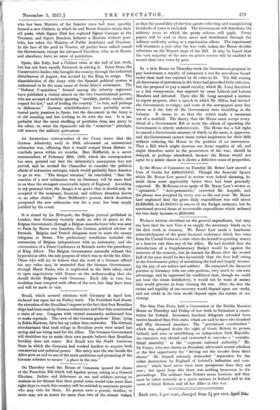In a thin House on Thursday week the Government proposal
to pay landowners a royalty of ninepence a ton for petroleum found under their land was rejected by 44 votes to 35. The Bill vesting all discoveries of petroleum in the State had provoked little criticism, but the proposal to pay a small royalty, which Mr. Lang described as a fair compromise, was opposed by some Liberal and Labour Members and defeated. Upon this Mr. Long accepted a motion to report progress, after a speech in which Mr. Dillon had invited the Government to resign; and some of the newspapers next day wrote as if the fate of the Government were trembling in the balance. It seems to us that the critics made a mountain out of a molehill. The theory that the House must accept every detail of a Government Bill or incur the odium of upsetting the Government is utterly undemocratic. The House has a full right to amend a Government measure of which, in the main, it approves, and the Government cannot claim verbal inspiration for their Bills without reducing the House to the position of an automaton. That a Bill which might increase our home supplies of oil, and might therefore assist in the prosecution of the war, should be delayed, or perhaps abandoned, because the House would not agree to a minor clause in it shows a defective sense of proportion.














































 Previous page
Previous page